Virgil sat for two days while the strange grass around him died in the heat. At night he slept on the ground and in the daytime he sat once again. At some point, he remembered not when, he unhitched the horses from the wagon and hobbled them. When he drank the last of the water from his canteen they had crowded close, pitiful with dehydration. It was only his sympathy for the horses that got him up and moving again.
Where the well had once been in the town of Grantham, he found the barest seep of water. It was muddy and brackish, but when he dug it out it refilled gradually.
When the horses had drunk, he strained muddy water through his neckerchief into a canteen.
On the next day, he heard the lowing of cattle and soon cowboys drove a herd into view. These were some of the hands from the Bar D, and their north herd. They looked at Virgil's face and saw their madness mirrored in his eyes. They asked him where the town had gone and Virgil told him that he did not know, but that it had taken his family with it.
They told him how they had awoken to find the other bunkhouse, the corrals, barns, and ranch house missing. And all the other hands and the Burdocks.
"I had wife and children," said Virgil. No one spoke after that.
They sat a long time as the afternoon turned to night, bereft of an explanation. Finally, the setting sun moved some of the cowboys to go out in search of firewood. As one of them saddled up he asked, "if this isn't Grantham, then what is this place?"
Virgil said, "Nowhere."
"Hunh,” said the cowboy, “a town called Nowhere,” and rode on.
The Cowboys stayed that night, slaughtering one of the beeves for dinner. Virgil got some flour from his wagon and they had steak and biscuits. Even though his heart was broken and he was adrift in a cruel world that he could not force to make sense, the easy way of the Cowboys lifted his spirits. They were free and unencumbered by family or attachment. They joked and sang and carried on as young men always had. And their pranks and cocky banter brought a smile to Virgil's face.
In the morning, they rode back north to graze the herd. They said they'd get through the calving and the fattening, then drive the herd to the railhead in Tucson, sell the stock and head their separate ways. What would Virgil do, they wondered? He had no answer for them. He did not know himself. As they rode off, the youngest said, "Put up a saloon in this town of Nowhere and we’ll visit more often.”
Virgil thought long and hard about what he could do. Could he give his old life up for lost -- be as accepting and carefree as those Cowboys? Maybe he could head down to Mexico. Hell, he might drift back to Bisbee, and kill Fetterman just for the enjoyment of it.
In this incomprehensible situation, he could see how Fetterman was the reasonable person to blame. If that shifty bastard had honored his contract, Virgil would've been in town when whatever had happened had happened. He would still be with Laura and Mac and Pen. It hurt to think of them. It hurt to close his eyes at night and see their sweet faces. Hear their squeals of delight, and Laura's whisper in his ear. Remember the light in Mac's eye when he looked up at him with pride, even though Virgil knew the boy would feel differently if he knew the truth of his father's past.
He vowed he would be with them again, no matter what it took.
What if they were dead? He shook his head to rid himself such an evil thought. They lived yet, he could feel it. With furious anger, he willed it to be so. For if they were dead, where were the bodies? But then, where hadthey gone? And how have they managed to take the buildings with them? The questions circled endlessly in spirals. Where were the people? Where were the buildings? But where were the people? But where were the buildings?
The next day he was sick of drinking muddy water, and even sicker of questions that had no answers. He spent all day gathering wood. That night he made a bonfire. The smoke from the fire rose straight into the air, up to the cold and indifferent stars that twinkled down on one man's problems from so impossibly far away.
He remembered an old Indian and the smoke of another fire in the Oklahoma Territory years ago. After Chickamauga, he had fallen in with guerrilla fighters. Murderous men who fought from ambush and showed no mercy. Virgil had wanted to have done with the war, but it wasn't safe to ride the lawless territories alone.
But since a man named Grundy had deserted their rough company he had spend more and more time thinking about it. The rumor had gone around the camp that Grundy had been a Union spy. Virgil had thought nothing of it, there were a million rumors in war and this was just one more. Bill Crawford, the leader of the 5th Arkansas Irregulars had taken a different view.
They had ridden a day out of their way, deep into the mountains, to an abandoned Indian encampment. Abandoned except for one old man, living in a badly patched army tent.
The old Indian stood in the door of his tent and said nothing as they rode up.
From his horse Crawford said, "I know you're not a good Christian man, but it doesn't seem too much to ask for a word of greeting."
"I thought maybe you had come to shoot me, so I wasn't wasting my breath," said the Indian.
Crawford acted like he was genuinely hurt by this, even though they were, for all intents and purposes, a band of outlaws. He asked, "Now why would you think such a thing?"
The old Indian shrugged and said, "that's what happened to everyone else," indicating the crumbling wigwams and the abandoned fire rings of the settlement.
"I thought maybe they left on account of your poor manners,” Crawford said.
The Indian shook his head sadly and said, "They are still here. You see the wildflowers?" And only then did they notice the patches of brilliant color scattered throughout the settlement. Bright mounds where the prairie had grown up into and around the bodies of the fallen.
"Jesus Christ, why do you stay here?"
With a strange light in his eye, the old Indian said, “It’s quiet here and I hope the spirits will come visit.”
Uncomfortable with this whole line of questioning Crawford got to it. "They told me you track men."
"I send after them, I don't go get them." And then Crawford nodded and they talked price. When the Indian had settled his fee he nodded again, as if resigning himself to an unpleasant task, and gathered sticks. None of the Arkansas Irregulars helped him. They all watched, most smoking pipes, laying on the ground, but none speaking.
The old Indian made a fire and the smoke from it rose in a thin line. He muttered to himself in Cherokee, then turned to the white man and said, "not enough smoke." He walked into the abandoned village and soon came back with more wood and a handful of moldy rags that had once been a tunic. He built up the fire and threw the damp fabric on top. Soon smoke roiled from the blaze. Then the old Indian asked for an article of clothing from the man Crawford wish to hunt. Crawford handed him a battered hat that Grundy had left behind when he fled. The Indian cut a strip of the felt and added it to the foul-smelling blaze. Then he began to chant.
The smoke formed into a dense column that rose straight into the sky. So high that it hurt Virgil's neck to seek the top of it. Then, as if a wind had sprung up, the smoke curved off to the southeast, but Virgil felt no breeze.
Crawford looked at Virgil and said, “You stay here and watch him. See he doesn't put out the fire and run off.”
Virgil nodded. It was OK with him, he'd always liked Grundy. Well, at least as much as he had liked any of these boys. The Irregulars rode on and Virgil sat down.
When old Indian stopped chanting Virgil pulled his gun and asked, “Don't you have to keep that up?"
The Indian said, “No, that's not how it's done. The chanting is mostly for show, so the secret can't be stolen by a rival tribe or evil shaman. That kind of thing. But there are hardly any more tribes and no more shaman. You can shoot me if you want to, I have lived long enough. Just don't let the fire go out."
Virgil felt foolish and put his gun away. "I wasn't gonna kill you. I… I just been riding with bad men so long I guess I became one."
"You don't like them much,” said the Indian.
"No, I guess I don't."
"But they are your tribe," said the old Indian.
"I'm a white man, we don't have tribes."
"Everybody has tribes,” said the old Indian. Then he asked, “Do you want something to eat?"
After a long pause, Virgil nodded and the Indian went into his tent. Virgil followed. The Old Indian laughed at Virgil and said, "I'm too old to run away."
Virgil said, "You got tricks and secrets, just like everybody else." The Indian nodded at this and smiled. Then he got some jerky and some acorn flour and went back to the fire. He mixed the acorn flour with water and made flatbread using an iron skillet. He gave the first piece to Virgil. It was bitter, but good. Virgil went to his horse and got some apples and a piece of rock candy that he broke in half to shared with the Indian. They had a meal.
When he had gnawed his fill of deer jerky, Virgil stared up at the smoke that still trailed off to the Southeast. As he watched, he saw it head around to the South a little. He said, "It's moving. Do you need to do something?"
The old Indian sucked on the rock candy and said, "The man it is seeking is moving."
"That's a neat trick," said Virgil.
"Do you want to know how to do it?"
"Why would you tell me that?"
The Indian looked around and sighed. “because there's nobody else left to pass it on to. And where the other ones tried to scare and bully me, you shared your food with me."
"You shared your food with me," said Virgil.
"Those bad men are not your tribe. You should leave them before they bring you to a bad end."
"It's hard to go out on your own. These are bad times and rough hombres."
The old Indian sucked his piece of rock candy and sighed contentedly. He said, "I have never had rock candy before. It's good. Doesn't taste like rock at all." Then he smiled. And Virgil smiled too.
"You have a destiny, I think. You will need this knowledge."
As Virgil watched, the old Indian gathered up broken twigs and arranged them in a place he cleared on the ground. At first, Virgil thought this was stupid folklore, but the more the man worked the more that the pattern seemed to be saying something to him. Something that couldn't be put into any tongue. Something about the seasons and the night, about the mother of all things and what a man should do with his time on the earth. About the ties that bind things together and how a man could be followed, even when he hadn’t left tracks. The old Indian hummed to himself as he worked and the tune of the song was a part of it too.
Virgil didn't understand it, it just became like something he had always known. He heard the rock candy clacking against the old man's remaining teeth and that was part of it too. Then his eyes were drawn to the empty patch in the middle of the pattern of sticks.
The Indian spat the rock candy into that empty spot on the ground. Where it landed, Virgil saw a flash of light. The sticks moved and weaved themselves together. The light shrank, gathering in on itself. Then it rushed outward engulfing Virgil in its brilliance and for a while there was no Virgil, there was only light.
When Virgil came back to himself, the old man was lying on the ground and the fire was going out. Now giving only smoke. Virgil rose on shaky legs and gathered more wood. In a daze, he scavenged small branches and twigs. Then he dragged two poles from a collapsed teepee and placed the ends in the fire.
Only when the blaze was rekindled again, did he think of the old Indian.
The old man was face down in the design of sticks, the piece of rock candy in the dirt next to his head. Then Virgil knew he was dead, and wondered why he had not seen it right away. Virgil knew other things too, but did not know how he knew them. Nor could he say how he felt the magic of the smoke pushing through the sky behind him. He felt it wane and then the smoke released and drifted aimlessly in the sky. He knew that they had found Grundy and he knew also what they had done with him.
He sat alone with the dead Indian and waited. He waited until he could no longer understand the meaning of the wind, until the pattern of sticks 0n the ground lost its movement and became just more twigs for the fire.
When Crawford and his men returned they asked him if he killed the Indian. Virgil said no. And he said nothing of what he had seen in the pattern, or what he had heard on the wind, or what he had learned in the light. He mounted his horse and rode on, the way a normal man would.
He had forgotten about the old Indian's gift until his memory had been jogged by one of the Cowboys asking, “Why do you stay here?”
And the Indian’s words had answered through him, “It’s quiet here and I hope the spirits will come visit.”
As he sat in front of his bonfire he fixed his mind on his wife Laura. It would have been easier to work with a piece of her clothing, or a lock of her hair, but just like the chanting, it wasn't the important part. The important part was the desire.
He found it hard to picture her face, but he had an image of her hair blowing in the wind as he as she had driven the wagon and he had ridden behind her. In this moment, she was scanning the horizon ahead, her body eagerly leaning against the wind, straining with excitement and impatience to be at their destination. This memory was from the trip they had made to Grantham to open the store. And that day had been pure and brilliant in a way that only days in the high desert could be. He had loved her then, and had even managed to love himself a little, thinking that the evils of their past were behind them. Later, he would realize, she had been pregnant with Mac on that trip.
He yearned for her, letting loose the strings of the bag deep inside that held his emotions. The terrible longing washed out of him and into the fire. It rose into the smoke, and the smoke, like water finding the easiest path to the sea, found the quickest path to his desire.
He saddled the horses, loading one with provisions, then followed the smoke and its high, unwavering arc to the northeast. For seven days and seven nights he rode until he could not see the smoke anymore. Then he would stop, build another fire, and ride on again.
He climbed mountains and crossed rivers, until at last, he found himself on a featureless plane. He traveled so far onto the plane that he could no longer see the mountains behind him. And but for the rising and setting of the sun, he could not tell the directions of the compass. The stars above were unknown to him, and every place he looked on this grass-swept plain looked the same as every other place looked. Finally, he came to the center of nothing. Here, the smoke arced downward and pooled to form a cloud bank, a sooty fog in the featureless nowhere.
Without hesitation, he rode into the smoke.
From the outside it roiled like a fog bank, but inside the smoke became thinner and somehow luminescent. The featureless plane became a featureless space. He was weary, weary beyond belief and he dropped the reins, giving his horse his head. The hoofbeats against the prairie grass were dull and heavy, coming from a long way away, as if he journeyed through wool instead of smoke.
He looked behind him and he could not see the pack horse, just the arc of the lead rope disappearing into nothing. Then he was afraid. He feared that he would dissolve into the featureless nothing. Trapped inside smooth walls that yielded infinitely, but would never let him pass. Searching for a door in a place where he was not shut in, but from which he could never leave.
Ahead of him he heard a cough.
The horse’s head jerked up, and Virgil clawed for the reins. As he drew the horse to a stop he heard the cough again and a voice asked "how many fires did you burn?"
"Seven," said Virgil, for it did not seem the time or place to hold back the truth. There was a loud clap and the smoke was pushed back in a rush of air.
There was the old shaman sitting cross-legged on the pigmentless grass with his palms held together out in front of him. He looked at Virgil with a smile on his face and said, "seven days, that is how many days it should take. Well, you've come all this way, you might as well rest a while,” he said with a shrug, "after all, time doesn't pass here."
Virgil dismounted and moved to hobble his horse with a strip of rawhide. The old Indian said, “Don't bother, there's there's only nowhere they can go."


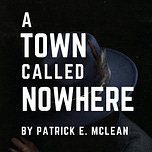



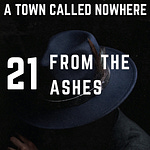
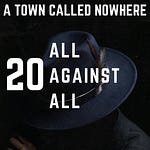
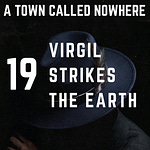


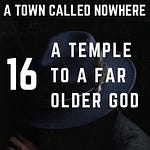
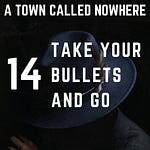
Share this post